
APPLIED BIOCHEMISTRY AND MICROBIOLOGY
Scope & Guideline
Innovating Research at the Intersection of Life Sciences.
Introduction
Aims and Scopes
- Biochemical Characterization of Microorganisms:
Research articles often focus on the biochemical properties and metabolic pathways of microorganisms, providing insights into their functionality in various environments and applications. - Biotechnological Applications of Microbial Processes:
The journal explores the use of microbial systems in biotechnological processes, including enzyme production, bioremediation, and the synthesis of bioactive compounds. - Microbial Genetics and Molecular Biology:
Studies in this area investigate genetic modifications, gene expression, and the molecular mechanisms underlying microbial behavior, which are crucial for advancements in synthetic biology and genetic engineering. - Environmental Microbiology and Bioremediation:
Papers frequently address the role of microorganisms in environmental processes, including pollution degradation, nutrient cycling, and the development of sustainable agricultural practices. - Microbial Applications in Medicine and Health:
The journal also emphasizes research on the medicinal properties of microorganisms, including their role in disease treatment, probiotic applications, and the development of antimicrobial agents. - Innovative Analytical Techniques:
Research showcasing novel analytical methods for the detection and quantification of microbial products, metabolites, and interactions is a key focus, enhancing the understanding of microbial dynamics.
Trending and Emerging
- Synthetic Biology and Genetic Engineering:
There is an increasing emphasis on synthetic biology techniques to engineer microorganisms for specific applications, including the production of biofuels, bioplastics, and pharmaceuticals. - Metagenomics and Microbial Ecology:
Research focusing on metagenomic approaches to understand complex microbial communities and their functional potentials is gaining traction, reflecting the importance of ecosystem-level studies. - Nanobiotechnology Applications:
The integration of nanotechnology in microbiological research, particularly in drug delivery systems and biosensors, is emerging as a significant trend, showcasing innovative applications. - Probiotic and Functional Foods Research:
There is a growing interest in the health benefits of probiotics and functional foods, with studies exploring their mechanisms of action and potential therapeutic applications. - Environmental Remediation Technologies:
Innovative approaches to bioremediation, particularly those utilizing engineered microorganisms or novel bioprocessing techniques, are increasingly prominent in the journal's publications.
Declining or Waning
- Traditional Antibiotic Research:
There has been a noticeable reduction in studies centered around traditional antibiotics, likely due to the increasing focus on novel antimicrobial strategies and the rise of antibiotic resistance. - Basic Microbial Taxonomy and Identification:
Research that primarily focuses on the classification and basic identification of microorganisms without applied context appears to be waning, as the field moves towards more functional and applied studies. - Conventional Fermentation Processes:
Papers discussing standard fermentation processes without innovative modifications or applications are becoming less frequent, as the field shifts towards more advanced biotechnological approaches. - Single-Organism Studies:
Research focusing solely on individual microbial species without considering their interactions within ecosystems or biotechnological applications is declining, as there is a growing emphasis on community dynamics and multi-species interactions.
Similar Journals
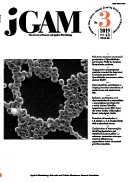
JOURNAL OF GENERAL AND APPLIED MICROBIOLOGY
Bridging theory and application in microbial science.JOURNAL OF GENERAL AND APPLIED MICROBIOLOGY, published by the MICROBIOL RES FOUNDATION, is a vital resource in the fields of applied microbiology and biotechnology, as well as in diverse medical applications, serving an academic community dedicated to advancing microbial science. Established in 1955, this journal has a rich history of disseminating innovative research and insights into the intricate world of microorganisms. With an ISSN of 0022-1260 and an E-ISSN of 1349-8037, the journal maintains high scholarly standards and robustness, reflected in its 2023 Scopus rankings placing it in the Q3 and Q4 quartiles within its categories. While primarily based in Japan, the journal engages a global audience, offering valuable contributions that inform both theoretical perspectives and practical applications in microbiology. Despite being a non-open-access publication, it provides pivotal research findings essential for academics, professionals, and students alike, fostering a deeper understanding of microbial impact on health and the environment.

Microbial Physiology
Fostering Discoveries for Health and SustainabilityMicrobial Physiology is a premier, peer-reviewed journal published by KARGER, dedicated to advancing the field of microbiology through innovative research and reviews. With an ISSN of 2673-1665 and an E-ISSN of 2673-1673, the journal stands out in the academic landscape having established a strong track record since its inception in 2020, converging its scope until 2024. It proudly holds a Q2 category ranking in several key areas including Applied Microbiology and Biotechnology, Biochemistry, and Microbiology, making it an essential resource for researchers and professionals in these disciplines. The journal provides open access options to ensure that cutting-edge findings are widely disseminated, fostering collaboration and knowledge sharing. As a vital contributor to the ongoing discourse in microbial physiology, the journal serves as a platform for novel discoveries and methodologies that can significantly impact health, industry, and environmental sustainability. Located in Basel, Switzerland, it brings together a global community of scholars eager to further explore the complexities of microbial life.

CRITICAL REVIEWS IN BIOTECHNOLOGY
Pioneering Thought Leadership in Applied SciencesCRITICAL REVIEWS IN BIOTECHNOLOGY, published by Taylor & Francis Ltd, stands as a leading journal in the field of biotechnology, consistently recognized for its rigorous peer-reviewed articles that impact the disciplines of Applied Microbiology, Biotechnology, and Medicine. With an impressive Q1 ranking in these categories and a significant influence reflected in its Scopus rankings—placing it within the top 5% of Applied Microbiology and the top 4% of Biotechnology journals—the journal serves as an essential resource for researchers, professionals, and students alike. Launched in 1983 and extending its coverage to encompass groundbreaking findings through 2024, it provides a rich forum for insightful reviews and innovative research that propel the field forward. Though not an Open Access journal, CRITICAL REVIEWS IN BIOTECHNOLOGY remains a vital point of reference for ongoing developments, critical analyses, and emerging trends, making it indispensable for those seeking to stay at the forefront of biotechnological advancements.

WORLD JOURNAL OF MICROBIOLOGY & BIOTECHNOLOGY
Catalyzing Innovation in Microbial Processes and TechnologiesWORLD JOURNAL OF MICROBIOLOGY & BIOTECHNOLOGY, published by Springer, serves as a pivotal forum for advancing the fields of microbiology and biotechnology since its inception in 1990. Located in the Netherlands, this esteemed journal has secured a prominent position in the academic landscape, recognized for its strong impact factor and prestigious Q2 category rankings across disciplines such as Applied Microbiology, Biotechnology, and Physiological Sciences. Researchers and professionals utilize this journal to disseminate innovative findings and explore emerging technologies that are transforming the scientific landscape. With a robust submission rate and high visibility among the academic community, the journal fosters interdisciplinary collaboration, encouraging discussions that bridge gaps between theory and practical applications. As it converges into 2024, the WORLD JOURNAL OF MICROBIOLOGY & BIOTECHNOLOGY continues to be a vital resource for scholars aiming to enhance our understanding of microbial processes and biotechnological advances.
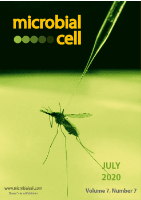
Microbial Cell
Empowering knowledge sharing in the microbial sciences.Microbial Cell is a distinguished open-access journal published by SHARED SCIENCE PUBLISHERS OG, focusing on the dynamic fields of microbiology, biochemistry, and molecular biology. Since its establishment in 2014, Microbial Cell has been at the forefront of disseminating cutting-edge research essential for advancing our understanding of microbial functions and interactions. With a commendable impact factor and ranking in the top quartiles (Q1 and Q2) across several categories, including Applied Microbiology and Biotechnology and Parasitology, this journal serves as an invaluable resource for researchers, professionals, and students alike. It features a comprehensive scope that encompasses the latest findings in genetics, cell biology, and virology, facilitating the academic community's access to high-quality peer-reviewed work. Microbial Cell not only contributes to advancing microbial sciences but also fosters an inclusive platform for knowledge sharing and collaboration in the scientific community.
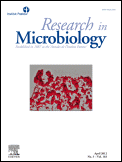
RESEARCH IN MICROBIOLOGY
Fostering innovation in microbiology for a global audience.Research in Microbiology, published by Elsevier, is a prominent academic journal devoted to advancing the field of microbiology, encompassing a diverse array of topics including immunology, molecular biology, and biochemistry. Established in 1987, the journal has expanded its focus over the years, with a commendable impact factor reflecting its relevance and influence in the scientific community. Although it does not currently offer open access options, Research in Microbiology remains a crucial resource for researchers and professionals seeking to stay abreast of the latest findings and methodologies. The journal holds a respectable Q2 ranking in Medicine (miscellaneous) and a Q3 ranking in both Microbiology and Molecular Biology for 2023, highlighting its position within the scholarly landscape. With its base in France and accessible to a global audience, Research in Microbiology continues to foster scholarly exchange, making it an essential platform for the dissemination of impactful microbiological research.
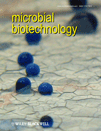
Microbial Biotechnology
Championing open access to transformative microbial research.Microbial Biotechnology, published by WILEY, stands at the forefront of innovation in the field of applied microbiology and biotechnology, showcasing cutting-edge research and advancements within both academic and industrial contexts. As an Open Access journal since 2012, it ensures that high-quality research is easily accessible to researchers, professionals, and students globally, promoting knowledge sharing and collaboration. With an impressive impact, the journal holds a Q1 ranking in its categories—Applied Microbiology and Biotechnology, Biochemistry, Bioengineering, and Biotechnology—demonstrating its significance in the scientific community. The journal currently boasts a strong Scopus ranking in several relevant disciplines, including a top 10% position in Applied Microbiology and Biotechnology, highlighting its critical role in disseminating influential findings. Designed to foster dialogue and advance technology within the microbial sciences, Microbial Biotechnology is an essential resource for anyone committed to leveraging microbial processes for sustainable and innovative solutions.

JOURNAL OF MICROBIOLOGY
Leading the charge in microbiological research and innovation.JOURNAL OF MICROBIOLOGY, published by the Microbiological Society Korea, is a prestigious peer-reviewed journal dedicated to the advancement of knowledge in the fields of microbiology, applied microbiology, and biotechnology. Established in 1996, this journal serves as a vital platform for researchers and professionals from around the globe to disseminate their findings and engage in multidisciplinary discussions pertaining to microbial sciences. With an H-index that reflects its impact, the journal holds a commendable Q2 ranking in key categories including Applied Microbiology and Biotechnology, as well as Medicine (Miscellaneous), which underscores its significance in the academic community. Despite being a subscription-based journal, the JOURNAL OF MICROBIOLOGY aims to contribute to the understanding of microbial processes and their applications, facilitating advancements that are essential in health, industry, and environmental sciences. Researchers, students, and practitioners are encouraged to explore this rich resource for the latest research and trends in microbiology.
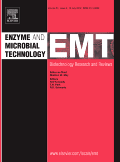
ENZYME AND MICROBIAL TECHNOLOGY
Pioneering Research in Applied Microbiology and BiotechnologyENZYME AND MICROBIAL TECHNOLOGY, a premier journal published by Elsevier Science Inc, serves as a pivotal platform for researchers and professionals dedicated to exploring the dynamic intersections of microbiology, biochemistry, and bioengineering. With a rich publication history dating back to 1979 and converging until 2024, this journal has established itself within the Q2 quartile rankings across multiple categories, including Applied Microbiology and Biotechnology, Biochemistry, Bioengineering, and Biotechnology, highlighting its influential role in advancing scientific discourse. It holds impressive Scopus rankings, where it is recognized in the 79th percentile for Applied Microbiology and Biotechnology and ranks favorably in related fields, making it a valuable resource for academic and industrial researchers looking to stay abreast of the latest developments. Although it does not currently offer Open Access options, ENZYME AND MICROBIAL TECHNOLOGY remains an essential read for anyone invested in the biotechnological applications of enzymes and microorganisms.

JOURNAL OF BASIC MICROBIOLOGY
Advancing the Frontiers of Microbial ScienceJOURNAL OF BASIC MICROBIOLOGY is a premier publication in the field of microbiology, published by WILEY since 1985. With a significant presence in Germany, this journal encompasses a wide spectrum of research topics, focusing on applied microbiology and biotechnology as well as diverse areas within medicine. Holding a commendable Q2 ranking in both its categories for 2023, it plays a crucial role in disseminating innovative findings and methodologies to the community. Researchers will find it to be an essential platform for sharing high-quality work, where it currently stands at rank #47 in the applied microbiology and biotechnology category, representing the 63rd percentile among international journals. The JOURNAL OF BASIC MICROBIOLOGY caters to a growing audience of professionals and students, offering insights essential for advancement in microbiological research and its applications. While it does not currently offer an Open Access option, it remains an influential outlet for academic excellence, continuously contributing to the development of the field through its rigorous peer-reviewed articles.